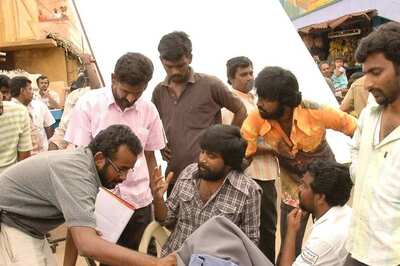
views
Beirut: In Tunisia and Egypt, Facebook vied with "Down with the regime" on graffiti-filled walls - so central were social media to mobilising mass protests that overthrew their authoritarian rulers.
But in tightly-controlled Syria, with a pervasive security apparatus, Internet penetration of less than 20 per cent and heavy restrictions on foreign media, cyber activists are mostly using the web just to illustrate the extent of unrest.
"What we saw in Egypt and Tunisia was huge online activism turning offline (onto the streets)," said Wissam Tarif, a human rights activist who has been closely following the protests against President Bashar al-Assad's rule.
"In Syria, online cyber activity is reporting what is happening offline," he told Reuters from Syria.
A Syrian activist who goes by the name Abu Adnan coordinates a network of like-minded 'citizen journalists' across the country who film protests that, more often than not, end in a crackdown by security forces, according to witnesses.
Their mobile phones may be no match for an AK-47 assault rifle, but they have trained the world's eyes on usually hidden corners of one of the West Asia's most secretive countries.
Authorities blame "armed groups" for the violence.
Abu Adnan said there were many people who were eager to film protests and clashes but did not have the experience or resources to do so. They were also fearful of a state that routinely monitors users' web activity.
Using his connections with the media and organisations that promote citizen journalism, Abu Adnan set up fellow activists with secure connections, satellite telephones, smartphones and cameras.
"Four friends of mine died. One was in Douma (a Damascus suburb), filming with me. A sniper on rooftop chose him. He could have chosen me. One was executed after he refused to stop on his motorcycle. One was arrested and released dead and one was shot in Deraa," Abu Adnan told Reuters from Syria.
"The state media are fabricating what is happening in Syria and if I can help these guys show what is happening, then I should. If I don't use my connections (with the media) now, then there's no use to them."
"THERE COULD HAVE BEEN A MASSACRE"
Nearly a month into demonstrations that have posed the most serious challenge to Assad's 11-year rule, it is not yet clear whether increasing violence against protesters will eventually force them to stay home or incense them further.
For Abu Adnan, one particularly bloody confrontation two weeks ago was a turning point, convincing him it was better to record the demonstrations than try to instigate them.
"We organised one protest in Douma and there were 11 martyrs. So we decided to stay away from organising protests and instead focus on covering the events," he told Reuters.
Even that, he says, comes with risks.
"Personally, I don't mean to change (the regime). What is important to me is to document what is happening, the crimes that are being committed," he said. Syria's main human rights group has put the death toll at 200.
Media face severe restrictions inside Syria. Authorities expelled Reuters Damascus correspondent last month and three other foreign Reuters journalists were expelled after being detained for two or three days. A Syrian Reuters photographer was held for six days.
The lack of access means independent media rely heavily on footage recorded by activists. Abu Adnan said that without their efforts the state would have felt less vulnerable.
"At the same time, I see what we do as protecting the young men from more brutal acts by the regime. If it weren't for our documentation, there could have been a massacre."
The bloody episode of Hama - when Bashar's father President Hafez al-Assad crushed an armed Islamist uprising in 1982 by sending in troops who killed thousands and destroyed many parts of the city - is never far from Syrians' minds.
"I heard security forces telling each other be careful, there are cameras, don't draw your weapons," Abu Adnan said.
"WE CONFRONT THEM WITH MOBILE PHONES"
His friend, an activist who is a 23-year-old student at Damascus University, agrees on the importance of documenting events in Syria which would have been unthinkable just a few months ago, before the uprisings in Tunisia and Egypt.
"When the media report a news item, and there isn't documentation, audio and visual, then it's just ink on paper. But when there are images, there's credibility to the news."
State media have aired footage of what they said were gunmen firing into a crowd from behind a wall in Deraa, the southern city where protests started in March.
Syrian media, and Assad himself, have criticised "satellite channels" for what they consider biased and false reporting of the unrest.
Activists say that makes it vital to authenticate videos they receive from their networks before publishing them. They do that by comparing several clips of the same protest, contacting the people who post the items, checking dates and trawling the web to see if the footage could be old.
Syrian authorities have employed tactics tried by embattled rulers attempting to quell uprisings elsewhere: turning off the Internet and telecommunications in areas that have seen major protests or before security forces enter a city.
Deraa, cradle of the uprising in Syria, is largely offline. A poor, tribal town, not many of its people were Internet-savvy anyway. Yet despite an intense crackdown - most of the deaths happened there - footage of enraged people smashing statues of Assad's family members made it online.
"They confront us with Kalashnikovs, we confront them with mobile phones," said Abu Adnan.



















Comments
0 comment